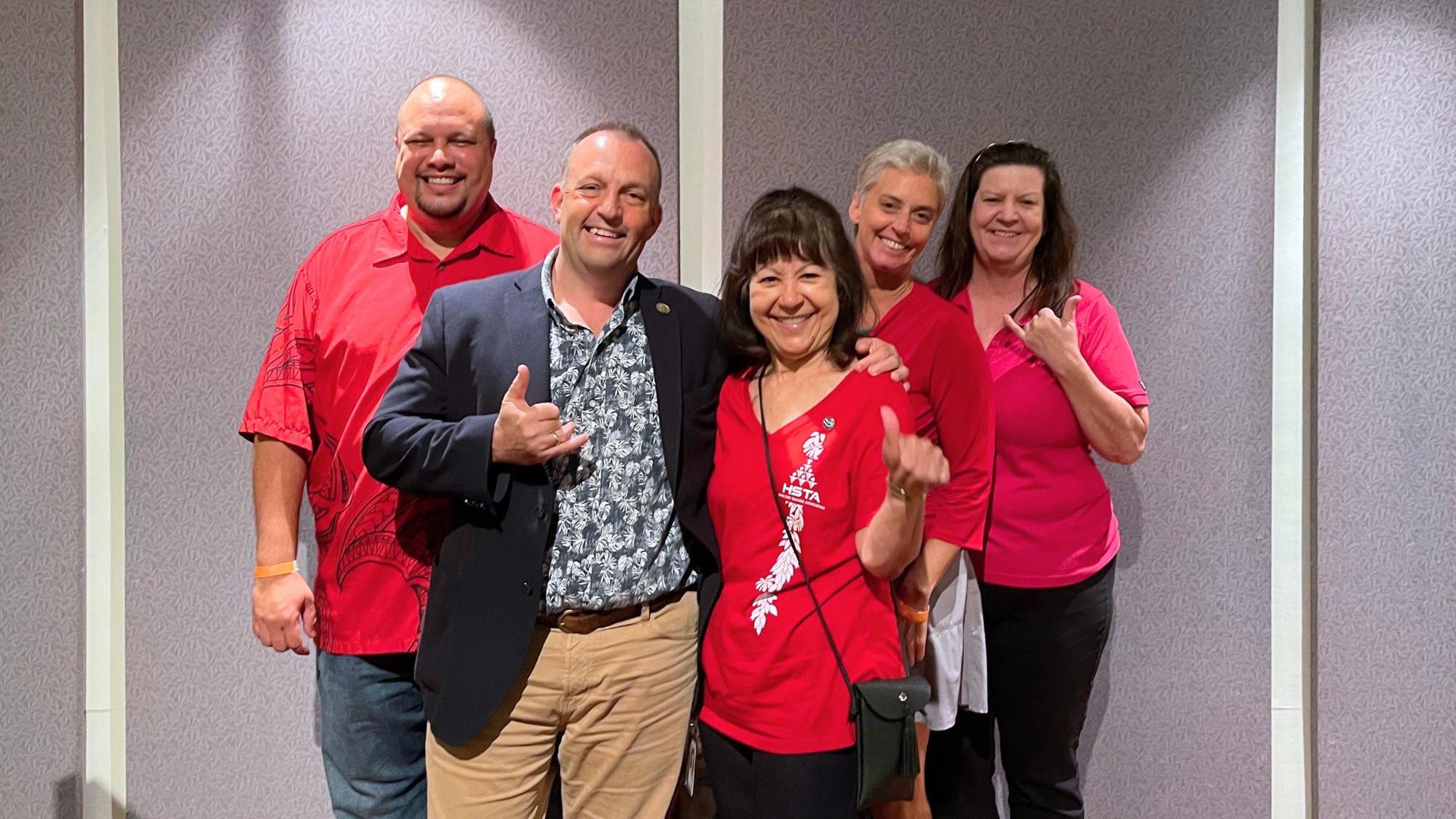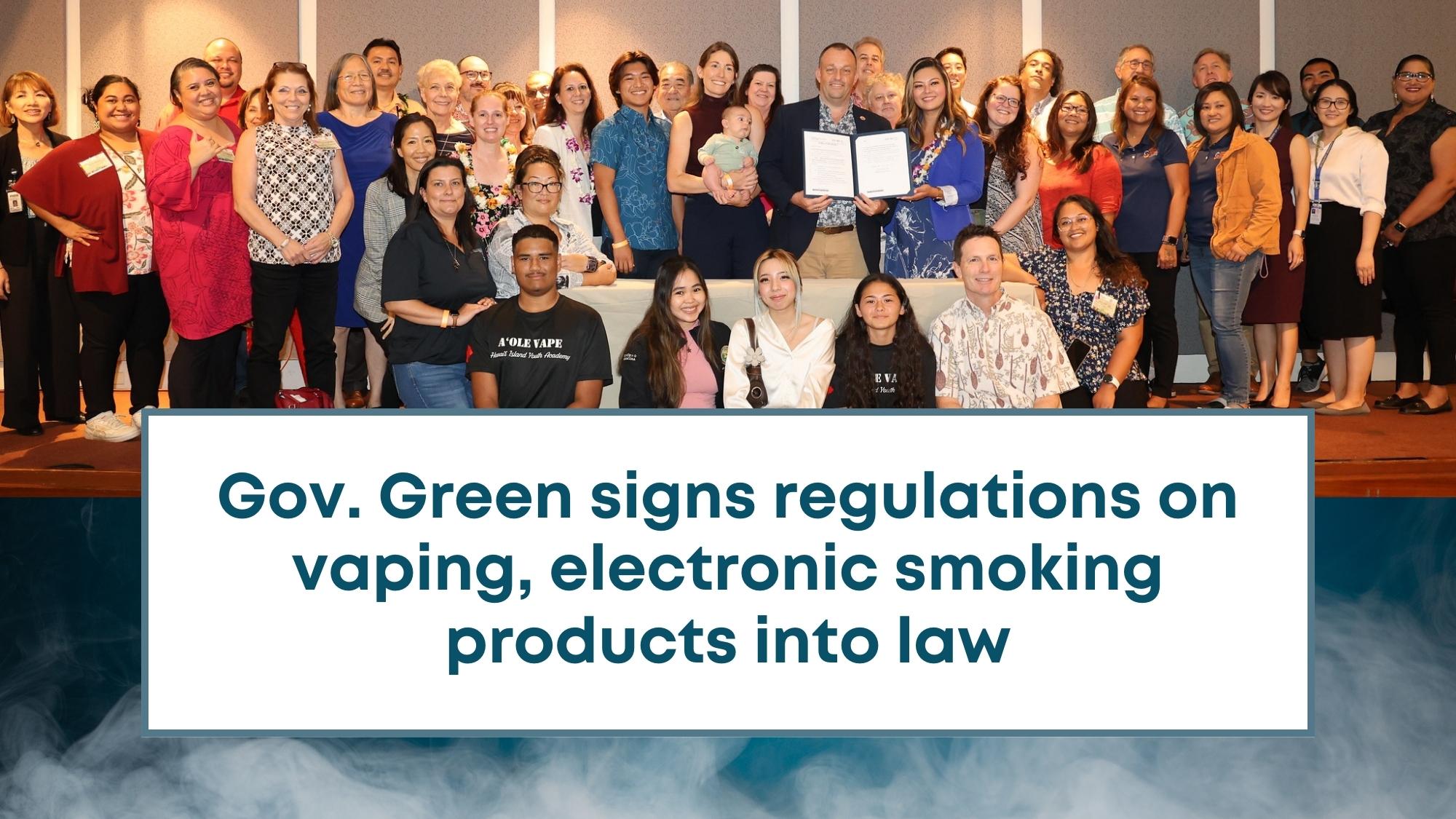HSTA members spotlight harmful consequences in schools, classrooms
Updated: June 6, 2023
Ameasure to tax and regulate electronic smoking devices and e-liquids in Hawaiʻi officially became law Tuesday. Lawmakers and advocates call it a strong first step in the fight against the state’s youth vaping epidemic.
Gov. Josh Green signed Senate Bill 975, which will tax electronic smoking devices and e-liquids, similar to tobacco products, and restrict shipping to wholesalers and retailers, meaning they could no longer be shipped directly to individuals. The measure was approved by the state Legislature in May.
“Regulation and taxation are tools that we have. They are critical in a comprehensive approach to dealing with the youth vaping epidemic,” Green said, “and we know it works and we know it will continue to work, because this is the model that we used on traditional cigarettes.”
Green has been a longstanding advocate in the fight against big tobacco, having chaired the Senate Committee on Health and subsequently Human Services from 2011 to 2018 (the two have since merged into a single committee). He recalled the fight alongside former state Sen. Roz Baker, who chaired the Senate Committee on Commerce and Consumer Protection.
“By raising the taxes over the years, when Roz and I were running those committees, we were able to decrease tobacco use and increase resources for public health,” he noted, “so this is the right model.”

Photo above from left: HSTA President Osa Tui, Jr., Gov. Josh Green, HSTA Teacher Lobbyist Laverne Moore, HSTA Secretary-Treasurer Lisa Morrison, HSTA Government Relations Specialist Mitzie Higa. Photo in featured graphic (top) courtesy Office of the Governor.
Teachers integral in fight against youth smoking, vaping epidemic
For years, the Hawaiʻi State Teachers Association has worked with fellow advocates to advance legislation that protects our youth against the predatory practices of the tobacco and vaping industry, and in 2021, the HSTA Board of Directors joined the Coalition for a Tobacco-Free Hawaiʻi Youth Council.
HSTA President Osa Tui, Jr. said he’s happy to see the bill signed into law Tuesday. “As teachers, we see some of the things that our students get into that parents don’t see. There are even students vaping in elementary school, and that’s something we don’t want to see creeping down earlier and earlier into these students’ lives.
“As educators, our kuleana isn’t limited to books or assignments. We support the entire well-being of our keiki to ensure they are safe, happy, healthy, and able to reach their fullest potential, in and out of the classroom,” Tui noted. “We’ve seen over the years as we’ve taxed cigarettes more and more, that it became out of reach of our students, and we want to make sure something similar happens with vaping products.”
Campbell High School accreditation and data coordinator Christine Russo says a lack of regulation provided youth with easy access to electronic smoking devices.
“What this bill has accomplished, I think, is really important because taxing it, creating parity with other tobacco products, will make the product less accessible,” said Russo.
“It’s been shown that the taxation on traditional cigarettes actually was one tool that was successful in curbing cigarette smoking, and so the increased taxation will be very helpful, as well as regulation on shipments. It’s making it more difficult for kids to get their hands on these products,” Russo said.
Laverne Moore, a special education teacher at McKinley High School and HSTA teacher lobbyist, says while a lot of data confirms the harms of electronic smoking on a youth’s health, very little addresses the impact on their education.
HSTA’s Government Relations (GR) Committee, made up of volunteer educator leaders from across the state, highlighted the educational impacts during this recent Legislative session, Moore said.
“(Lawmakers) really didn’t know that students in elementary school were vaping. They had no clue,” said Moore. “All the GR Committee members went to educate every single legislator as to the impact in schools — how the students are performing in school, how they’re leaving the classroom, how sometimes, when they’re aggravated, they threaten other students, and the other students are afraid. Nobody knew that story. It was our teachers telling those stories that made an impact.”
Hope McKeen, Keonepoko Elementary School kumu ‘ike Hawaiʻi (Hawaiian studies teacher) and GR Committee state chair, said the team focused on explaining how often teens are vaping and how it affects their learning. “Teens are so hooked on nicotine that when they do not get it, they get agitated and disruptive. This then interrupts their learning and the learning of others so that they can go take their hit of nicotine vape,” McKeen said.
Moore added, “They have short attention spans. They get aggravated very easily. They walk out of the classroom whenever they want to.”
Moore says while electronic smoking devices are banned, students often sneak them into school.
“I was able to identify in my class when the students were vaping. They wear these long hoodies and then they have it in their arms. They’re meeting in the bathroom and sharing different devices,” Moore said. “Sure, they (schools) take away all these vaping instruments and then it gets all collected, but where’s the support for the teachers, and where’s the emotional health for our students?”
Russo, a former HSTA teacher lobbyist, agrees. “You never want to accuse the student of doing something and be wrong, so the fact that (the devices are) very nondescript makes it hard to watch out for that in the classroom, and kids have ways to do it without being obvious to the teacher,” she said.
Lawmakers, advocates pledge more actions to come
Lawmakers and advocates say more needs to be done to fully address the youth vaping epidemic, like banning flavored nicotine products that appeal to youth and lead to addiction. While lawmakers have previously considered this option, a bill has yet to be passed.
Rep. Scot Matayoshi, who chairs the House Committee on Labor and Government Operations, said, “We know that nicotine is incredibly addictive — about as addictive as heroin — but yet we’re making it accessible to kids. We’re giving them candy flavors. This is absolutely insane to me. We’re currently dealing with a public health crisis that smoking has created. We know what’s coming, and yet we haven’t moved enough in that direction.”
Mitzie Higa, HSTA government relations specialist, says the tobacco industry needs to be held accountable. “In 2009, the FDA (Food and Drug Administration) banned flavors for regular cigarettes; they banned everything except menthol, and the reason was because it entices youth to smoke. The same thing needs to happen again for vaping — but this time we want to include banning menthol — and until the FDA acts, the state needs to act.”
Russo added, “I think a multipronged approach is important and flavors still need to be banned. That’s something that still needs to happen, and I know HSTA will continue advocating for that.”

